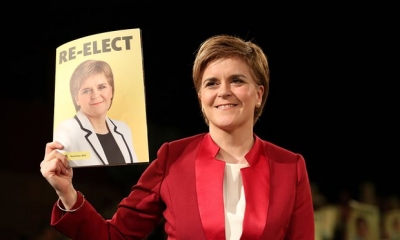This morning the First Minister and leader of the Scottish National Party, Nicola Sturgeon, launched perhaps the most hotly anticipated manifesto in Scottish political history.
While the Scottish Conservatives, Liberal Democrats, and Greens each launched their respective manifestos in relatively low-key events, (Scottish Labour isn’t publishing its manifesto until the week before polling day), the SNP’s launch was more like a rock concert or a Las Vegas boxing match than a political event.
Although to be fair, SNP politicians and supporters alike are becoming accustomed to significant crowds, high on enthusiasm, attending their conferences and launches. The party has seen membership surge to more than 115,000 since 2014’s referendum, making the SNP the third biggest party across the whole of the UK.
The manifesto itself is perhaps most notable for the absence of a firm commitment to holding a second referendum on Scottish independence, much to the frustration of many within the pro-independence camp.
It instead pledges to begin ‘new work’ over the summer to persuade a ‘clear majority’ of Scots that ‘independence is the best future for our country’. It also states that the Scottish Parliament ‘should have the right to hold another referendum’ if and when there is ‘clear and sustained evidence’ that a majority of Scots want independence, or indeed there is a ‘significant and material change’ in the circumstances that led to the No side’s victory in 2014, including a potential Brexit.
The headline commitments that do make the manifesto include increasing NHS funding by £500m over inflation throughout the next five years, providing ‘baby boxes’ full of essentials to the parents of all newborns across Scotland, targeting a 50% reduction in emissions by 2020, doubling free child care, and improving access to education and training.
Reaction so far has been fairly muted, with no real surprises or radical policy changes contained in the document. This was, however, to be expected with polls consistently indicating that the SNP are almost certain to be returned to government, potentially with an increased majority.
With Scotland’s other political parties apparently scrapping for second place, the SNP’s approach appears to be: if it ain’t broke, don’t fix it.




